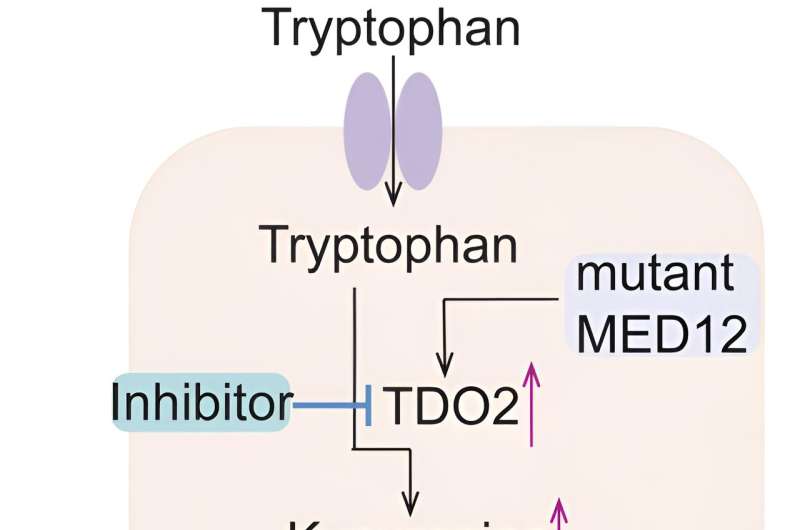This article has been reviewed according to Science X's editorial process and policies. Editors have highlighted the following attributes while ensuring the content's credibility:
fact-checked
peer-reviewed publication
trusted source
proofread
Study identifies novel cellular mechanisms promoting growth of uterine fibroids

Investigators have discovered a novel molecular pathway that promotes tumor growth in uterine fibroids that contain a specific genetic mutation, which could inform the development of new targeted therapies, according to a Northwestern Medicine study published in the journal JCI Insight.
Uterine leiomyomas, or fibroids, effect approximately 10 million reproductive-age women and individuals with uteruses in the U.S. each year. It is estimated that up to 80% of these individuals will develop at least one fibroid by the age of 50.
Additionally, one-third of these individuals will develop severe symptoms, including heavy and irregular uterine bleeding, anemia, pregnancy loss or infertility. Furthermore, symptomatic uterine fibroids disproportionately affect Black women compared to other racial and ethnic populations.
"They [leiomyomas] are probably the most important public health problem of reproductive-age women across the world, and in the U.S., they're fairly common," said Serdar Bulun, MD, the chair and John J. Sciarra Professor of Obstetrics and Gynecology and co-senior author of the study. "Black women also develop symptomatic fibroids about 10 years earlier than white women, and the statistics show that fibroids are detected three or four times more commonly in Black women compared with white or non-Black women."
There are no long-term therapies currently available for uterine fibroids due to a severe lack of research exploring the underlying mechanisms of uterine fibroid tumor growth, according to Bulun.
Work published in the last two decades established that the MED12 gene was mutated in 70% of uterine fibroid tumors and when MED12 is mutated, the tumors rely on progesterone to grow. This discovery prompted Bulun's team to determine how the MED12 mutation catalyzes cell proliferation in uterine leiomyoma cells.
In the current study, the investigators used RNA sequencing to study both normal and mutant-MED12 leiomyoma cells. Using these techniques, they discovered that the TDO2 (tryptophan 2,3-dioxygenase) gene was upregulated in mutant-MED12 leiomyoma cells.
In these cells, TDO2 initiates the conversion of the amino acid tryptophan into an internal hormone called kynurenine, which is attached to and in turn activates a transcription factor called aryl hydrocarbon receptor (AHR). When AHR is activated, it signals leiomyoma cells to grow and proliferate.
To further confirm their findings, the investigators activated this newly discovered TDO2-kynurenine-AHR pathway in mutant-MED12 leiomyoma cells with tryptophan or kynurenine which, in turn, promoted cell proliferation and inhibited apoptosis, or cell death.
This suggests that activating the TDO2-kynurenine-AHR pathway could inform the development of new long-term targeted therapies, according to the authors.
"This [TDO2] is a very important enzyme because 70% of people who have uterine fibroids have this mutation, and if we can find the compound to inhibit the activity of the enzyme, I believe we'll be able to decrease the symptoms of fibroids or shrink fibroid size," said Ping Yin, MD, Ph.D., research associate professor of Obstetrics and Gynecology in the Division of Reproductive Science in Medicine, who was co-senior author of the study.
The findings also highlight the importance of uterine fibroid research, which can help accelerate new precision medicine treatments for a disease that effects nearly all women, Bulun said.
"This is one of the only programs which brings a lot of investigators in a multidisciplinary fashion to study fibroids and look for molecular targets so that we could help women with this disease," Bulun said.
More information: Azna Zuberi et al, MED12 mutation activates tryptophan-kynurenine-AHR pathway to promote growth of uterine leiomyoma, JCI Insight (2023). DOI: 10.1172/jci.insight.171305


















